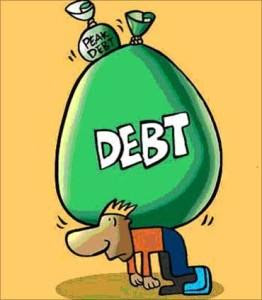6 ways to Manage Debt

The pandemic has brought instability and uncertainties in the economy and therefore it has become important for us to manage our finances more systematically to face any upcoming uncertainties. Follow these simple 6 steps and you will always have no debt stress or find yourself in a debt trap.
Step 1…Know what you OWE
To make sure that you don’t miss your payments and to maintain good credit history and a good credit score, figure out exactly how much do you owe, to whom and how much. Keep a record of all your loans and credit cards, including information such as:
Account / card number, lender/card provider, type of debt (housing loan, auto loan, credit card, etc.) payment due, date due, interest rates, term, billing cycle and minimum payment due.
Keep these details (on your computer or in physical form) – ensure you have a copy stored elsewhere and most importantly, keep it safe and protected. And most importantly, update this information as and when required.
This will also help you grade the debt you have taken and accordingly prioritise your ability to pay off your debts. It will also help you to determine your servicing capacity, specially for new loans you are planning to take. To prioritise your debt, you should rank them in the order of preference of:
- Highest interest rate to the lowest interest rate
- Type of loan (unsecured loans, credit cards and high interest-bearing loans should be paid off first)
Step 2 – Pay off dues on time
‘To build a good credit score and to maintain a healthy credit history, pay back your debt on time’.
Please note that there are tax angles you should also consider whilst repaying your loans; for example, there are provisions in the Income Tax Act, for interest and principal repayments on housing loans and on education loans.
Step 3 – Prepare a Family Budget and pay your debts
Meaning of Budget:
Proper allocation and managing of funds and these funds should be bucketed in such a manner that they are used to pay your debts, maintain your lifestyle and can be used at the time of emergency (contingent funds).
The budget should stand up to a test in good and bad times. As of in this current scenario it is important that you should allocate your funds in such a way that you are prepared for any emergency. It can be medical or any other financial crisis. Also, reduce your debt burden by managing a proper allocation of funds in your budget.
Step 4 – Lower your BORROWING COST
Always pay back the higher interest loans first.
There are various facilities available in the market which will help you to transfer from a higher interest rate loan to lower interest rate loan.
For example, in case of credit cards and housing loans.
For credit cards, making a minimum payment does reduce, to an extent, the repayment burden but has a ballooning effect which will ultimately have a serious impact on your cash flows. Also, the interest rate on credit card outstanding is very high. Thus, at times making minimum payment is not bad but to avoid a cascading impact, you should repay all outstanding in the next cycle.
But there are no free lunches in life; you need to understand the implications of the switch and read whether there is any catch in the “font 2 size “agreement which has all the hidden costs which may not be disclosed upfront to you.
Step 5 – Set up an EMERGENCY FUND
As we read in Step 3 about how to manage your budget, you should have some reserve funds for emergencies like the current situation that we are in. These funds will come to your rescue at the time of a medical emergency, which unfortunately can be a major cost. Not only medical these funds will prepare you for any uncertainties that might arise. Additionally, having a fund like this, will ensure you don’t have to pull out investments and other savings at such times.
Resist the temptation of dipping into this fund, either for day-to-day expenses or buying “desirables”, keep the funds away and assume you don’t have them, and hopefully you will never need them! As a figure, you should keep and plan for around 3-6 months of your monthly expenses as the amount in the fund.
The other name for emergency funds is ‘Contingency funds.
Step 6- Live within your means
This is often hard to follow but the absolute truth always. You should spend money wisely – within your capacity. The same applies for debt, borrow only what you absolutely need and what you can certainly service. The future being uncertain you must plan your finances looking forward and spend accordingly because there could be endless possibilities of business being shut down, losing of jobs, lockdown etc. in such situations you must be ready to take care of your family along with managing your existing debts.
Banks will be prudent lenders; you have to be a prudent borrower.
Spend or expense in cash and if not in cash, then restrict yourself to use the Debit card but never a credit card, because the temptation of the using credit card starts from the day it come in your hand and if you do use a credit card then pay back the dues on time.
Don’t cut on your lifestyle, that’s tough, just be careful whilst upgrading your life style, do it in a manner that doesn’t dig a debt hole for you to fall into that cash trap.





